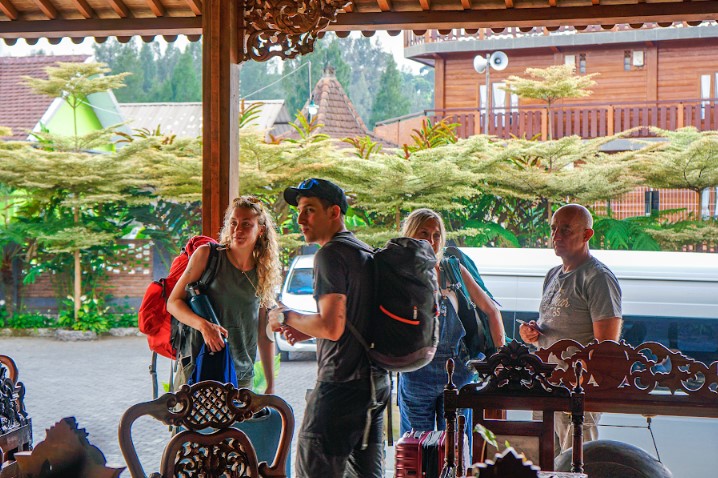(CNN) — During any life-changing event, there comes a moment when the fog of the crisis temporarily clears, and you realize with certainty that things will never be the same again.
That moment gets a lot of airtime in books and movies, often as a pivotal, middle-of-the-night epiphany in a protagonist’s narrative arc.
Sticking to the stereotype, that moment came for me at 5 a.m., on a morning about two months after I was left incapacitated by a lumbar puncture.
That was the instant that I realized I would likely never return to the life I’d worked so hard to build.
By then, I had spent almost a decade as an accidental entrepreneur, growing a business I loved centered around food and exploration. I quit my job as a lawyer in 2008, leaving for what I thought would be a one-year trip around the world. I planned to return to the legal field once that adventure ended.
I didn’t travel to reject societal norms; I simply wanted to experience life in an unconventional way. Even so, I discovered that travel returned perspective to me, something I had not realized I had lost during my years of corporate work.
Before I embarked on my career as a lawyer, I found it easy to put myself in someone else’s shoes and offer them grace. With 90-hour work weeks, I forgot some of those life skills.
I became more negative in my thinking, quicker to complain. Slowly exploring the world helped me recalibrate. I came back to the person I used to be.
I kept the site ad-free and instead focused on long-form writing and creating resources that my readers asked for, which provided me with an income. In turn, I gained a thriving community of people who were not only interested in travel and food, but also storytelling, curiosity and personal growth.
Then, in 2017, it all ended with a medical procedure gone wrong.
Incapacitated overnight
Prior to the procedure, I was informed that I may have a headache that would dissipate after a few days of rest. The lumbar puncture did not go smoothly, with multiple attempts needed in order to access my CSF.

Writer Jodi Ettenberg, standing in front of the Treasury in UNESCO-listed Petra, Jordan in 2011.
Jodi Ettenberg/Legal Nomads
Immediately following the procedure, I could barely walk. My legs were jelly, while at the same time it felt like someone had poured concrete into my lower spine. Within days, I could not stand up. My brain felt like it was sagging in my head, as if it were an anvil pushing down into my neck. When in bed, the room spun. I felt too nauseous to eat, and had trouble finding words. My back burned uncontrollably from top to bottom.
Together, these symptoms rose to a level of pain that left me reeling.
Searching for care
Despite the straightforward narrative that I was incapacitated following a lumbar puncture and had none of these symptoms prior, I was denied a blood patch at the hospital that performed the procedure. They told me that my symptoms would abate on their own.
Later, after my parents retrieved me in the US and carefully drove me back to my hometown in Canada, I was rejected again. The hospital treated me for a migraine instead.
Unable to stand, I laid in bed in Canada in the months following my lumbar puncture feeling defeated. With no treatment options offered to me in the US or Canada, I dove into research studies and considered how to advocate for my next steps.
My community stepped up too. Friends launched a crowdfunding campaign to help support me as I searched for answers, others introduced me to additional patients who had suffered CSF leaks.
Thankfully, they accepted my case.
A descent into grief

Vietnam, in 2015.
Jodi Ettenberg/Legal Nomads
With the soonest available appointments at Duke months out, I descended into some of my most difficult weeks since the procedure. Physically, I was in a haze of discomfort. It felt like I had been zipped into someone else’s skin and my body was no longer my own. My only relief was lying flat.
Mentally, I grappled with being so dependent on my parents after decades of self-sufficiency. I couldn’t perform basic human functions that had been second-nature to me, like getting dressed or putting on socks.
I swung between anger at being confined to bed, and denial about my potential prognosis.
The nights that I could sleep, I dreamed of my apartment in Oaxaca and my ebbing hope that I would get back there one day. The more I read about complicated lumbar punctures and subsequent spinal CSF leaks, the less likely it seemed that I would return to my old life.
It was then that the 5 a.m. epiphany hit me, and I sunk into grief.
Road tripping to North Carolina

“I often described my bedbound state to friends as feeling like a puppy looking out the window as people played outside,” says Ettenberg, seen here visiting an alpaca farm in Akaroa, New Zealand in 2014.
Jodi Ettenberg/Legal Nomads
When I finally got to Duke, I had four rounds of epidural blood patching, where my doctor injected patches of blood and fibrin glue around my lumbar spine. The fourth patch sealed my leak, but I reacted to the fibrin glue and went into anaphylactic shock, requiring an epinephrine injection at the end of the procedure.
Recovery was lengthy, and it took weeks before I even knew whether the patch was successful. I slowly progressed from bedrest, to standing, to walking, with my community of readers cheering me on as I shared my progress.
The leak specialists said it was unlikely that I would be able to return to my prior adventures given my facts, but they hoped that I could lead an upright life that included travel with restrictions. I was hopeful, too.
Nearly a year after the lumbar puncture, I was able to walk many miles a day, including a triumphant scramble up Montreal’s Mount Royal for my birthday.
But then, a month later, everything fell apart.
I sat down cross-legged on the ground and felt pain lance across the leak site. I don’t know whether I stretched too far, or twisted the wrong way, but whatever it was, it was enough to undo eight long, hard months of rebuilding.
After being so careful about my movements, it was a shock that such a non-event could so thoroughly unravel my healing.
I felt my symptoms come back one by one, the telltale “brain sag” among them. I returned to lying flat again, realizing that even a life of modified travel was likely beyond my reach.
Processing the unfairness of it all
When things fall apart, we get stuck in the grievance of the moment. It’s maddening that some people have to shoulder more hardship than others in life. It’s infuriating that life just isn’t fair.
For many months after I re-leaked, I was caught in that state of listless despair. As a former lawyer, I am an expert catastrophizer. I had much to stress about, which gifted me ample material from which to craft robust worst-case scenarios. It wasn’t helpful for my healing, but that didn’t stop me from indulging in anger and fear and letting it corrode me from the inside.

Back in bed again after the writer’s spinal CSF leak re-opened in late September 2018.
Courtesy Jodi Ettenberg/Legal Nomads
Well-meaning people sent me Instagram posts about how positive thinking would help my healing. I read books about happiness, and about how daily affirmations could make me feel better. Yet every word I consumed made me feel more alone.
Gratitude is an effective tool, one among many, when nurtured as a skill. It is not a panacea for pain. And when we jump straight to gratitude without first sitting in the mess of our present, we skip a very important step.
I learned that what I needed initially was to process my anger and my loss. Striving to find beauty when I was in the thick of grief was akin to spiritual bypassing, thwarting my progress by camouflaging the mess. It was as if I were trying to pave over a pothole without first filling it in. The mess was still there.
I found a grief therapist with experience in chronic pain, who helped me understand that my feelings of isolation and anger were normal. Through therapy, I came to terms with the maelstrom of my emotions, and moved through them to a more accepting place.
Only then was I able to reframe each moment as a choice. I had to let beauty fill me up, instead of rage and grief.
Reframing the grievance of the moment
My travels helped me regain perspective after years of lawyering, but this leak journey put that viewpoint to the test. I thought that I was already appreciative of the small things in life, but that was not enough. In the thick of it, I had to actively choose how I wanted to wake up each day, and who I wanted to be.
At first, this intentional choice felt like a flavor of denial. Western society encourages a lot of all-or-nothing thinking, and I unconsciously mirrored that pattern in my own beliefs. Things could either be terrible, or they could be magical. That heuristic sets us up for a lot of disappointment, because the “either or” is not life. Life is all things together, at the same time. Life is simultaneously very beautiful, and very hard.
I realized, then, that reframing things doesn’t detract from the inequity of it all, or mean that I’ve given up on trying to seal my leak. I am in pain, yes, but I can allow myself to also feel joy again, moment to moment, amid the messiness. It no longer felt like a conflict to feel awful while also encountering wonder throughout my day.
Each setback became an opportunity to practice that reassessment of the moment, and train my mind away from the negative. When I catastrophized, I acknowledged the unfairness — but instead of dwelling on it, I actively shifted my focus to community, to nature, to the simple joys of sipping tea.
Throughout, I kept up with my therapy sessions, grieving my losses while also celebrating the choices that allowed me to revel in life’s small joys that I found.
Over time, thousands and thousands of these tiny joys strung together to light up my life in surprising ways. The result was something I never thought possible: the reframe became second nature.
This duality — an attention to granular details alongside the hard work of processing tragedy — provided me with a way through the melancholy of these last years.
Pandemic isolation was my norm

“I do get a few hours of ‘upright’ time a day,” says Ettenberg, seen here out for a walk in the summer of 2021 in Gatineau, Quebec.
Courtesy Jodi Ettenberg/Legal Nomads
I often described my bedbound state to friends as feeling like a puppy looking out the window as people played outside.
When the Covid-19 pandemic hit, the wider world got a taste of that isolation, and the mental toll that it can take.
Like me a few years prior, nearly everyone had to stop not only their travels, but also many daily activities that they previously took for granted. And many people were largely cut off from physical contact outside their households.
The collective grief that ensued highlighted how hard it is for anyone to be alone in the darkness. It takes effort to ask for help, or to reach out to others when feeling depressed.
It takes a willingness to be vulnerable, to share the anxieties that arise when the world becomes smaller. But doing so alleviates some of the burden that comes with relearning what it means to be human in a new landscape.
I recognized a lot of my mental struggles reflected back at me during the pandemic.
Conversely, my community messaged to say that they understood more of the heartache I processed during my journey. Though some of the world is opening back up, I will still be in bed.
My challenge is to maintain my focus on the beauty of the small, not the larger things I cannot participate in.
An uncertain future

“My travels helped me regain perspective after years of lawyering, but this leak journey put that viewpoint to the test,” says Ettenberg.
Courtesy Jodi Ettenberg/Legal Nomads
Will I ever be sealed again? I don’t know.
I had not heard of these conditions prior to my lumbar puncture, and only since researching each one do I better understand how small, seemingly unrelated symptoms actually had common root causes.
I have met patients with these conditions who have been trying to get sealed for many years, waiting for science to catch up with their needs.
Despite my complicated case, I hope to be able to return to Duke for another patch eventually.
These days, I am managing my symptoms as best I can. I am very limited physically, and my leak symptoms persist. I do get a few hours of “upright” time a day, likely due to my body overcompensating by producing extra CSF.
Whereas I used to explore countries and new foods, my days are now filled with internal exploration. An adventure of the mind, one that I also share with my online community, providing a different journey for us to undertake together.
My 5 a.m. moment was prescient after all. My life has not been the same. In all the messiness, I’ve learned to muddle through terrible times. Choosing possibility. Choosing hope. Choosing to celebrate the joy in the small, every single day.
If you had told me years ago that I’d be finding beauty in anything when I couldn’t tie my own shoes, I’d have laughed in your face.
But we’re all more adaptable than we think.
Somehow, even me.






More Stories
The Ultimate Guide to Mount Bromo and Ijen Tour: A Journey into Nature’s Wonders
The Complete Guide to Pantheon Tickets
Journey Through Italy